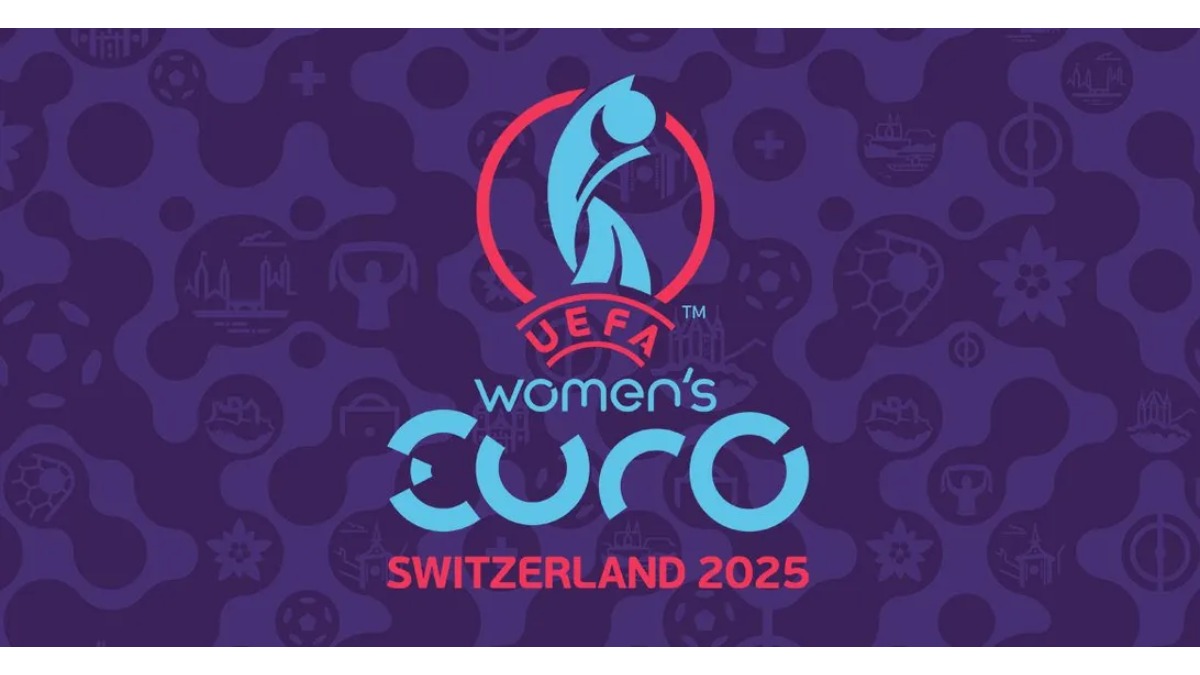Sports
UEFA Women’s EURO 2025: Full Schedule, Fixtures, Preview, Groups, Teams and How to Watch

Switzerland will host the 2025 UEFA Women’s European Championships from July 2–27. Reigning champions England will defend their title and attempt to become just the second country to win back-to-back Women’s EUROs in the 2025 UEFA Women’s European Championship, which is scheduled to begin on July 2.
The top-qualified teams from Europe are competing for the title in the 14th edition of the prestigious football tournament.
The top two teams from each of the four groups, which include sixteen participating nations, will move on to the quarterfinals.
The Swiss hosts have been placed in Group A, while reigning champions England will have a difficult time escaping Group D undamaged.
Germany, which lost to the Lionesses in the 2022 championship game, had won six in a row from 1995 to 2013.
All the information you require on the UEFA Women’s EURO 2025 competition, which is being held in Switzerland for the first time, is provided below.
Here is all the information you require as the competition draws closer.
When and where are the 2025 UEFA Women’s EURO games?
The match between Iceland and Finland begins at Arena Thun on Wednesday, July 2, at 18:00 CET. Switzerland will play Norway in Basel three hours later. The final will also be held at St. Jakob-Park on Sunday, July 27 at 18:00 CET.
The Stadion Wankdorf in Bern, the Stade de Genève in Geneva, the Stadion Letzigrund in Zurich, the Arena St. Gallen in St. Gallen, the Allmend Stadion Luzern in Lucerne, and the Stade de Tourbillon in Sion are also used for intermission games.
How does the Women’s EURO work?
The top two teams from each of the four groups advance to the quarterfinals, after which there is a straight knockout. Extra time and, if necessary, penalties are used when the game is tied after 90 minutes.
UEFA Women’s EURO 2025: Groups
Group A: Switzerland (hosts), Norway, Iceland, Finland
Group B: Spain, Portugal, Belgium, Italy
Group C: Germany, Poland, Denmark, Sweden
Group D: France, England (holders), Wales, Netherlands
UEFA Women’s EURO 2025: Tournament Preview
The favorite competitors heading into the month-long exhibition in July will be Europe’s usual leading giants.
England
The obvious choice is England, who are hoping to retain their championship following their spectacular 2022 victory. After defeating old opponents Germany in their first big event at home three years prior, the Lionesses were on the rise when they hired Sarina Wiegman following the 2020 Tokyo Olympics. They advanced to the FIFA Women’s World Cup final the following year, but Spain narrowly defeated them 1-0 to win the coveted trophy. Since then, their performance has been inconsistent, and now that two important players are out—Mary Earps and Fran Kirby are both retiring, and Millie Bright is not available—defending their title will put their commitment to the test.
Germany
Germany is currently by far the most successful country to compete in the tournament, and their history makes them a formidable competitor in each edition. They have advanced to the final nine times and won the title eight times in the previous 13 editions. Norway, which have won the trophy twice, is the team that is closest to them.
Even though the renowned Alexandra Popp retired abroad earlier this year, the Germans still have a very strong pool of players at their disposal. Sara Dabritz, Giulia Gwinn, and Ann-Katrin Berger have the experience to help Germany improve on its 2024 Olympic bronze medal.
Spain
Given their recent dominance in Europe, world champions Spain is perhaps the clear favorite overall. They became the first winners of the UEFA Nations League in 2024 after defeating England to win the global championship in 2023. They finished third in 1997, which was their greatest showing in Euros history; nevertheless, their erratic ascent meant that they were not eligible for the next three editions.
After losing in the quarterfinals of the previous three editions, Spain is scheduled to make their fourth consecutive appearance in 2025. However, they have demonstrated that the past does not always determine the present. They had only made it to the World Cup twice until taking over the world two years ago, losing in the group stage and the round of 16 in 2015 and 2019, respectively. Perhaps it is no accident that Spain’s current dominance has been directly impacted by the success of the Barcelona women’s team. After all, not every country can claim to have a midfield combination that won the Ballon d’Or: Alexia Putellas and Aitana Bonmati.
Outsiders
As the only other nations to win this trophy, Norway, Sweden, and the Netherlands can also offer their services. Since their recent performance indicates that this may not be their year, hosts Switzerland may need to mobilize their home supporters. However, there may still be optimism despite their relegation from the Nations League, given that the previous two winners of this tournament were both the hosts.
The 14th edition of the women’s Euros will include two debutants: Wales and Poland. Because of how strong this 16-team competition is, both teams were placed in incredibly challenging groupings.
England, France, and the Netherlands await the latter, while Denmark, Germany, and Sweden await the former. Making it to the knockout stages is a challenging task for both, but it is also the ideal stage for a potential upset.
UEFA Women’s EURO 2025 Dates, How to Watch Live
When: July 2-27
How to watch: Disney+
UEFA Women’s EURO 2025: Tournament Schedule
The tournament’s schedule for July 2025 is as follows:
UEFA Women’s EURO 2025 Group Stage Schedule
2 July – Group A
Iceland v Finland (18:00 CEST)
Switzerland v Norway (21:00 CEST)
3 July – Group B
Belgium v Italy (18:00 CEST)
Spain v Portugal (21:00 CEST)
4 July – Group C
Denmark v Sweden (18:00 CEST)
Germany v Poland (21:00 CEST)
5 July – Group D
Wales v Netherlands (18:00 CEST)
France v England (21:00 CEST)
6 July – Group A
Norway v Finland (18:00 CEST)
Switzerland v Iceland (21:00 CEST)
7 July – Group B
Spain v Belgium (18:00 CEST)
Portugal v Italy (21:00 CEST)
8 July – Group C
Germany v Denmark (18:00 CEST)
Poland v Sweden (21:00 CEST)
9 July – Group D
England v Netherlands (18:00 CEST)
France v Wales (21:00 CEST)
10 July – Group A
Finland v Switzerland (21:00 CEST)
Norway v Iceland (21:00 CEST)
11 July – Group B
Portugal v Belgium (21:00 CEST)
Italy v Spain (21:00 CEST)
12 July – Group C
Poland v Denmark (21:00 CEST)
Sweden v Germany (21:00 CEST)
13 July – Group D
England v Wales (21:00 CEST)
Netherlands v France (21:00 CEST)
UEFA Women’s EURO 2025 Knockout Round Bracket
Quarterfinals
Wednesday 16 July
Match 25: Group A winners vs Group B runners-up (21:00 CET)
Thursday 17 July
Match 26: Group C winners vs Group D runners-up (21:00 CET)
Friday 18 July
Match 27: Group B winners vs Group A runners-up (21:00 CET)
Saturday 19 July
Match 28: Group D winners vs Group C runners-up (21:00 CET)
Semifinals
Tuesday 22 July
Match 1: Winners of Match 26 vs Winners of Match 25 (21:00 CET)
Wednesday 23 July
Match 2: Winners of Match 28 vs Winners of Match 27 (21:00 CET)
Final
Sunday 27 July
Winners semifinal 1 vs Winners semifinal 2 (18:00 CET)
Which team has the best chance of winning the UEFA Women’s EURO 2025?
After winning their first major senior trophy at home in 2022 and making it to the FIFA Women’s World Cup final the following year, England are the reigning champions. After several global and European youth championships, they fell to Spain, who won their first senior title. La Roja then won the inaugural UEFA Women’s Nations League in February 2024.
Germany won six consecutive tournaments from 1995 to 2013, took home the trophy in eight of the 13 finals, won two World Cups, and won gold at the 2016 Olympics. They also defeated England in extra time in the 2022 final at Wembley.
The Netherlands proved it was no accident as they advanced to the Women’s World Cup final two years after winning as hosts in 2017. The Netherlands is still among the best, but Sarina Wiegman, the coach who orchestrated those wins, went on to England and duplicated the same achievements.
Due in part to Lyon’s club success during the same time period, France was frequently predicted to win trophies in the 2010s. However, they didn’t advance to their first Nations League senior final until last year.
Nordic teams have always been formidable, and Sweden’s bronze finish in the World Cup completed an all-European top three. Norway can also rely on superstars like Ada Hegerberg and Caroline Graham Hansen, while Pernille Harder’s Denmark shouldn’t be written off either.
What about the other competitors for the UEFA Women’s EURO?
If Switzerland wants to win three straight host championships, they will have a difficult assignment, but coach Pia Sundhage has a history of masterminding long runs in key tournaments with Brazil, Sweden, and the United States. Iceland is in their sixth consecutive final tournament, whereas Italy, who have a strong pedigree, finished ahead of the Netherlands and Norway in their qualifying group.
In 2022, Belgium advanced to the quarterfinals before Italy, who once more stand in their way in a group that also includes Portugal, which are rapidly developing. While Poland (with the prolific Ewa Pajor) and Wales have been handed difficult draws in their debut final tournaments, they have already defied the odds by qualifying. Finland hasn’t advanced past the group stage since 2009, but against Iceland, Norway, and Switzerland, that may change.
What size crowds can we expect?
With 574,865 spectators attending the 31 games, England 2022 broke all previous records with 87,192 people attending the final. This was more than twice the previous record. The goal is to surpass that threshold, with tickets starting at CHF 25 and free train travel inside Switzerland for all ticket holders.
How to watch the 2025 UEFA Women’s EURO
With multiple broadcasters collaborating with UEFA to deliver every second of the action to screens, there are numerous ways to watch the July spectacle throughout the world.
Games can be viewed on Play SRF, Play RTS, and Play RSI livestreams for hosts Switzerland. Fans of England can choose between the two top channels, ITV and the BBC.
World Champions Spain and other teams’ matches will be shown on RTVE, while those in France, Sweden, and Germany may be found on TF1, SVT, and Das Erste, respectively.
-

 Business4 weeks ago
Business4 weeks agoWhere There Is a Will, There Is a Way: Hayson Tasher and the New Year, New Me Mindset in Security Entrepreneurship
-

 Health4 weeks ago
Health4 weeks agoMy Juno Health Enterprise Partnerships Signal Shift From Claims Management to Utilization Prevention
-

 Business3 weeks ago
Business3 weeks agoAlain Khoueiry and His Mission to Present Kazakhstan as a Land of Opportunity and Wonder
-

 Health2 weeks ago
Health2 weeks agoShame, Trauma, and the Mind-Body Connection: How Dr. Karina Menali’s Kai Wellness Frames Emotional Healing as Integral to Physical Health
-

 Music4 weeks ago
Music4 weeks agoBTS will Return With ‘BTS THE COMEBACK LIVE | ARIRANG’ Concert and New Documentary on Netflix
-

 Tech3 weeks ago
Tech3 weeks agoBobby Atkins, Stonington Connecticut: How Effective Material Handling Supports On-Time Manufacturing Output
-

 Apps4 weeks ago
Apps4 weeks agoBest Apps with Simple IPO Application Process
-

 Business3 weeks ago
Business3 weeks agoStephen Straz: Building Success Through Business Leadership












